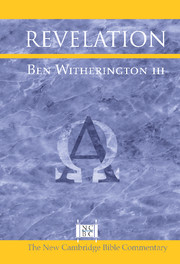Book contents
- Frontmatter
- Contents
- Preface
- A Word about Citations
- Map of Western Asia Minor and the Island of Patmos
- List of Roman Emperors
- List of Abbreviations
- I INTRODUCTION
- II SUGGESTED READING ON REVELATION
- III COMMENTARY
- IV APPENDIX: A MILLENNIAL PROBLEM
- Author Index
- Extra-Biblical Texts Index
- Scriptural Index
- Subject Index
III - COMMENTARY
Published online by Cambridge University Press: 05 February 2015
- Frontmatter
- Contents
- Preface
- A Word about Citations
- Map of Western Asia Minor and the Island of Patmos
- List of Roman Emperors
- List of Abbreviations
- I INTRODUCTION
- II SUGGESTED READING ON REVELATION
- III COMMENTARY
- IV APPENDIX: A MILLENNIAL PROBLEM
- Author Index
- Extra-Biblical Texts Index
- Scriptural Index
- Subject Index
Summary
REVELATION 1.1–1.3 – VISIONARY MATERIAL: HANDLE CAREFULLY
NRSV Revelation 1.1 The revelation of Jesus Christ, which God gave him to show his servants what must soon take place; he made it known by sending his angel to his servant John,
2 who testified to the Word of God and to the testimony of Jesus Christ, even to all that he saw.
3 Blessed is the one who reads aloud the words of the prophecy, and blessed are those who hear and who keep what is written in it; for the time is near.
Much has been and ought to be made of the fact that the Apocalypse, after the brief introductory remarks, starts and ends with epistolary elements. E. Schüssler Fiorenza has especially highlighted the parallels with the Pauline corpus. Notice that even the introductory phrase apocalypsis Iesou Christou is found in Paul's writings in various places (cf. 1 Cor. 1.7 to 2 Thess. 1.7), where it refers to the Parousia. But in what is probably Paul's earliest letter (see Gal. 1.12, 16) reference is made to an appearance of Jesus Christ to Paul in a vision, possibly alluding to his Damascus Road experience. Fiorenza thus is likely right to suggest that our author characterizes his experience as a prophetic visionary experience, not unlike Paul's. Notice too that like Paul the author never directly calls himself a prophet, but rather a doulos, a term used in the Hebrew Scriptures to refer to servant-prophets (cf. Amos 3.7). But there may be an implicit claim of authority in the use of this term, as there seems to be in the Pauline usage. If one is a servant of Jesus, one has a position of authority. At least in part John is writing to an area where Paul spent a considerable amount of time, though perhaps not in all these particular communities. It should not then be surprising if the Pauline Gospel and theology had affected John of Patmos. It was William Ramsay's conjecture that, by the end of the first century a.d., the primary locus of the Christian movement was in Asia Minor.
- Type
- Chapter
- Information
- Revelation , pp. 65 - 285Publisher: Cambridge University PressPrint publication year: 2003



